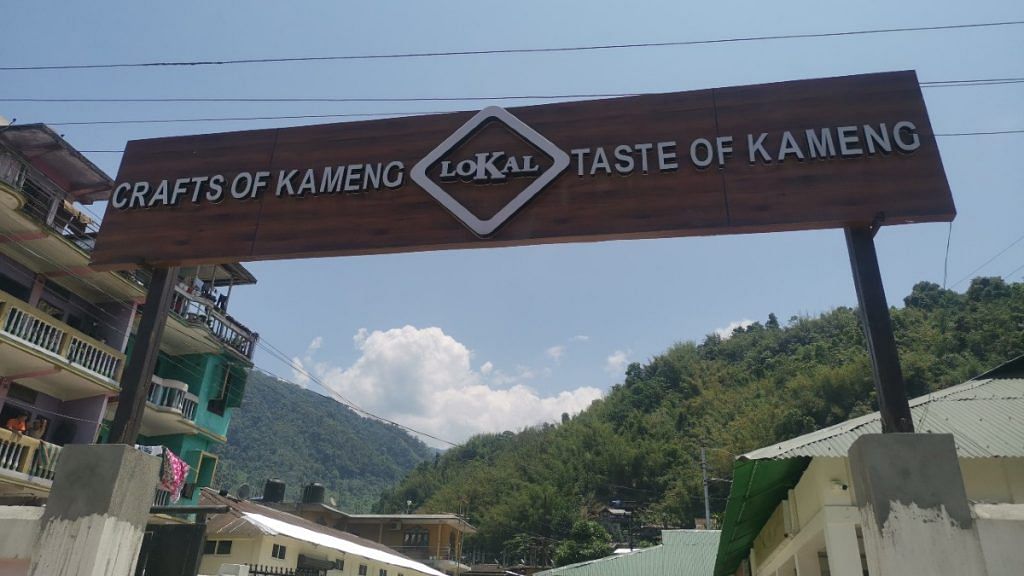Bana/Seppa: From sesame seeds of Lada, a village close to the India-China border, to an indigenous wild sago palm found in an obscure mountain hamlet called Chayangtajo, shelves of the ‘LOKAL’ supermarket in Seppa, the headquarters of Arunachal Pradesh’s East Kameng district, are lined with goods sourced from some of the remotest parts of the state.
‘LOKAL’ — Arunachal’s first self-help group-run market — was launched in February by the East Kameng Sangcha Ane Market (EXSAM) Co-op Soc. Ltd., an all-women cooperative.
The state’s economy is largely agrarian, based on cultivation of rice and crops like maize, millet, wheat, pulses, sugarcane, ginger, oilseeds, cereals, potato and pineapple. But due to poor road connectivity and infrastructure issues, its remotest districts, like East Kameng, have had to depend on neighbouring Assam for produce.
This is why facilitating access to local produce was among the key objectives the EXSAM had in mind while setting up the ‘LOKAL’ market at Seppa.
“A study by the Krishi Vigyan Kendra shows that there has been an increase in income by almost 60 per cent, more women are now taking up farming as an activity, investing in some small businesses or the health and education of the children,” Deputy Commissioner of East Kameng, Pravimal Abhishek, told ThePrint.
“Over 3,339 women from 342 self-help groups across rural parts of the district run 26 logistic points known as PLFs (primary level federations). The products come through those logistic points,” said Memak Rangmo Taba, chief promoter at the ‘LOKAL’ market.
“The sesame seeds from Lada, for instance, travel six hours on bad roads through the mountains,” she added.
Also Read: Defying all odds: How women in Maharashtra’s Maan spearheaded bid to make taluka drought-free
Self-help groups laid ground for change
According to the 2011 census, only about 46.87 per cent of women in the rural areas of East Kameng are literate. Until 2016, instances of child marriage were also being reported in the district, which mostly comprises members of the Nyishi community.
“Women here are often plagued by a patriarchal setup among the tribal communities. Then there are other issues like alcoholism and drug abuse,” a district official told ThePrint on condition of anonymity.
All that is now changing, and this change began with an initiative of the district administration, under the State Rural Livelihood Mission, to set up self-help groups or SHGs between 2017 and 2018.
For the nearly 100 women who live in and around Bana village, nearly 30 km from Seppa, these SHGs have been a boon. Nestled between mountains and the Bichom river, Bana is now home to a large number of shops run by women.
“It’s been four years since I started the business. Earlier, I used to sit at home with my family. But I wanted to run a business. Most women here have joined SHGs. I learned how to make achaar (pickle) during the training we received through the SHG. There’s a lot of profit in selling achaar,” said Yaro Sapong (29).
Nanjo Maloni Digiu, a 36-year-old corn farmer, says low-interest loans and occasional assistance during harvest season enabled her to deliver goods to the ‘LOKAL‘ market in Seppa through the SHG in Bana.
“Earlier, it was difficult to sell this product. We couldn’t find a market for the produce,” Digiu said, adding that for many of the women, the idea of SHGs was foreign at first.
Chief promoter at the ‘LOKAL’ market Taba too said that they were initially hesitant about the idea. “We didn’t trust the SHGs enough to give money. We would be scared to talk to people. But now, the situation of women is improving because of this. These women who are part of SHGs are also now speaking up at gram panchayats.”
“Initially, I also had to explain the concept of cash flow to these women,” East Kameng DC Abhishek said, adding that the brand was set up to “create livelihood opportunities for local women, increase farmers’ incomes, provide market opportunities for traditional handicrafts and ensure that the consumers have access to better quality products at cheaper prices”.
Handicrafts and GI tag
Beyond local fruits and vegetables, there is an entire section at the ‘LOKAL’ market for handicraft products, including bamboo products and the traditional gale, a garment worn by women of the Nyishi tribe.
The All East Kameng Weavers and Artisans Cooperative Society, another women-run cooperative society in Seppa, has applied for a Geographical Indication (GI) tag for Nyishi textile products.
According to the East Kameng DC, various organisations wanted to be the applicant for a GI tag for Nyishi textile products, but the district administration eventually zeroed in on the weavers and artisans cooperative.
Till now, only two products sourced from Arunachal Pradesh have received the GI tag — the Arunachal Orange and Idu Mishmi textiles.
“So far, there is no product from East Kameng apart from the orange that has a GI tag (secured) by an Assam-based organisation that is procuring these oranges. So, benefits don’t come in from there either,” DC Abhishek told ThePrint.
“In many districts of Arunachal Pradesh, products are now being identified for the GI tag application,” he added.
(Edited by Amrtansh Arora)
Also Read: Job losses, business closure — Covid hit female entrepreneurs. Here’s how to support them
